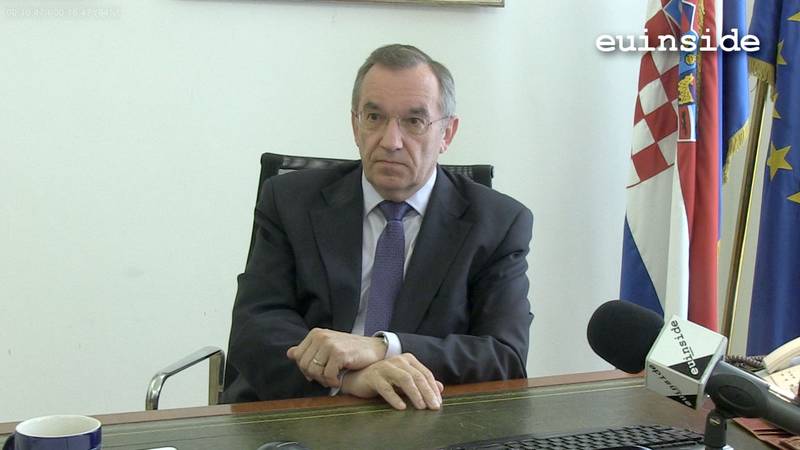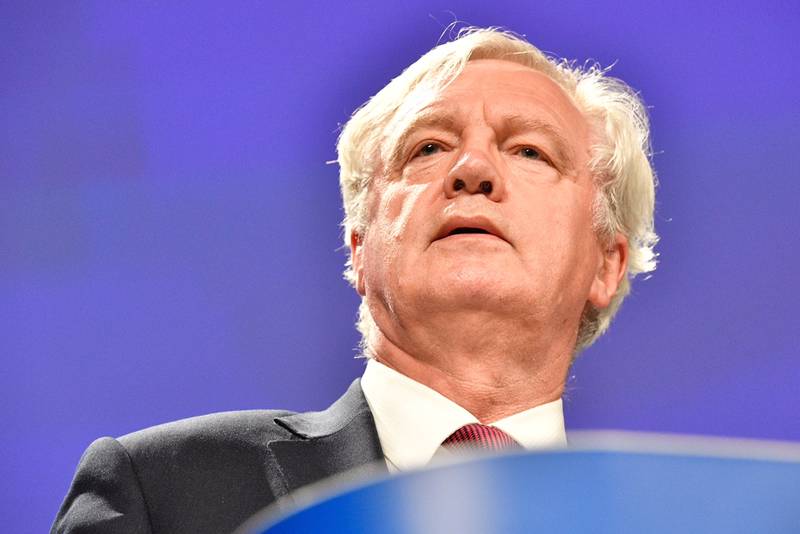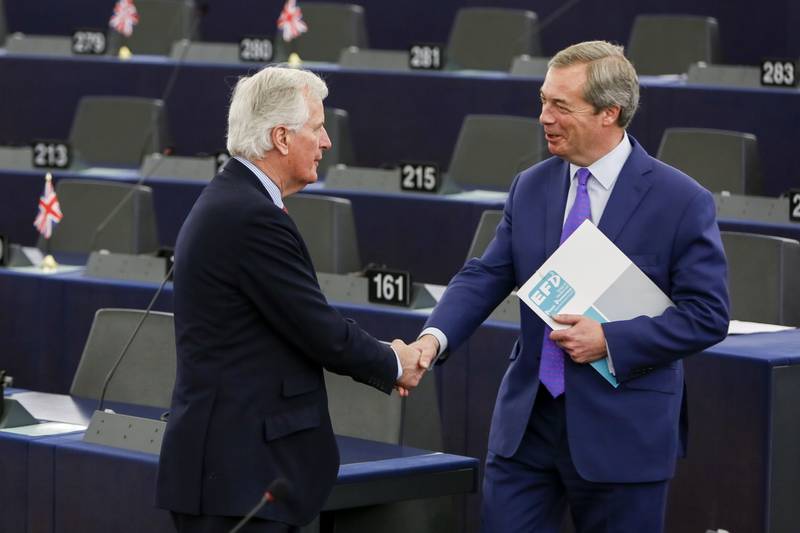Ivan Grdešić: Brexit Is Bad News for Enlargement
Adelina Marini, June 25, 2016
I meet Croatia’s Ambassador to Great Britain Dr Ivan Grdešić in London on the day after the Brexit. He is unpleasantly surprised by the result. He just came back from Dubrovnik, where he visited the premiere of “Hamlet”, played by a woman. This is a British-Croatian initiative, tells me His Excellency with certain sadness in his voice. Before coming to London, Ivan Grdešić used to be Croatia’s Ambassador to the United States. He is not a career diplomat. When not on a diplomatic mission, he teaches in the political sciences in the Zagreb university. He teaches Croatian political system, local democracy, and comparative public policies. He is active on Twitter (@IvanGrdesic) and does not mind being asked questions. He currently has the difficult task of representing his country in a hard time both for Croatia and Europe. Croatia is in a transitional period awaiting snap elections and is still recuperating from the heavy political crisis it dropped into six months ago.
In this very moment, the country might have to make important decisions because of the Brexit. Ambassador Grdešić is surprised by the result because, as he explains, life in London paints a different picture about Great Britain. There is a gap between London and the rest of Britain and this time the rest of Britain has won, is his initial analysis of the situation. He and other of his diplomatic colleagues hoped that conservatism and rationality of British voters will prevail and they will vote to remain. But such is democracy, he says. He does not believe Europe is at the brink of disintegration. The European project is still valid, but needs to be redefined, so that it fits the requirements of our day and age – globalisation, markets, developments outside the EU, especially in Asia and Latin America. Strong leadership and responsibility are required of the EU at the moment. Member states need to convene and decide on the way forward.
According to Ivan Grdešić, one of the reasons for the Brexit is democratic deficit and its exploitation. He does not exclude the possibility that radical right-wing, sceptic, nationalist, and claustrophobic political powers in Europe will make use of the Brexit. “This will feed their fear of migration, of foreigners, fear of otherness, and it will be certainly a great fuel on their hatred that they project on the ground”, he believes. This could only be averted by positive messages for tolerance and a positive future. At the end of the day the EU is just the institutional wrapper of Europe, but it represents European states and their way of life, says Dr Grdešić. He urges the EU to abstain from any revanchist attitude towards Great Britain.
For the benefit of all, it is best that the two-year period of renegotiation be democratic, to the common interest, and peaceful. It should not give political elites extra weaponry in the I-told-you-not-to-leave style. Statesmanlike behaviour requires finding ways for future co-existence, for the creation of new partnerships. This also includes telling the others, who are dubious about their membership, or wish to re-negotiate it, that their worries will be taken into account. Perhaps Great Britain was not treated well, thinks the Croatian ambassador, but believes that others could be treated fairer.

Does this mean he supports a European Union a-la-carte, I ask. Initially, he replies honestly that he does not know. Later though, he says the EU is a-la-carte at the moment as well. There are things that are good for some countries and not for others. “We have all decided to go to that restaurant, knowing what's on the carte”, he says. You need to be able to choose – some like vegetarian, others fish or beef. The quality of the food is important and that everyone gets their appetite sated in the European restaurant, so that people stay and return, further unfolds his metaphor Ivan Grdešić.
His biggest worry, however, is about enlargement. He anticipated my question by saying in the very beginning of the conversation that the news of a Brexit is bad for candidate countries, because the United Kingdom has always been an avid supporter of enlargement, always defending the wishes of candidates like Croatia was. He believes Croatia has the duty to ensure that the EU will keep its positive message and its attractiveness to candidate states. “We have to work harder on this so that they have a future in the EU”, said the ambassador. He admitted to expecting hesitance, especially in larger members, regarding the enlargement and this is understandable. It is necessary, however, that enlargement policy and neighbourhood policy be redefined. There is much to fight for, because an organisation that is not attractive for new members is in ruin.
The EU needs to have the capacity to deal with several crises simultaneously. It is important that the message to enlargement remains, for the European project is peaceful and will provide peace and stability to membership candidates as well. And what are we going to do if to Serbia, whose Prime Minister Aleksandar Vučić recently said the EU had lost its former attractiveness, the Brexit proves a turning point? It is true that some politicians will define the EU as less attractive after being left by a globally important country, which is a large economy, member of the Security Council, and a military power, answers Dr Grdešić. Its exit leaves a void, but NATO will manage to fill it, he says, and asks rhetorically what the alternative is. According to him, there is no alternative to the integration of Serbia, Montenegro, and Kosovo. During our conversation with the Croatian ambassador in the embassy in London, Serbian PM Aleksandar Vučić made an official statement in which he reaffirmed the European path of his country.
The ambassador said that he does not expect having a referendum in Croatia about a “Croxit” any time soon. Eurosceptic parties are too small and are practically individual voices. Croatia has not yet seen neither the bad, nor the positive consequences of its membership, and is still in the process of learning. In any case, the Brexit will be a lesson to Croatia to be more cautious regarding further EU integration, as well as regarding its own preparation for the euro area. “I don’t think that we are very eurosceptic but I think we have to be realistic and see where is our national interest and where it is not. But I think overall our membership is a national interest”, concluded the diplomat.
He did not agree to the comparisons, which have already been appearing in social media, to the disintegration of former Yugoslavia. He was adamant that any such comparisons are groundless, for in former Yugoslavia it was about changing countries, systems, ideologies – leaving communism and accepting democracy. The Brexit is a completely different thing. It is about a country, which leaves a certain institutional arrangement, but remains hugely involved in the economy, culture, politics, and defence. “So, I don’t think this traumatic comparison is valid”, continued His Excellency Ivan Grdešić. You can watch the full interview in English in the attached file.
Croatia expects no big concussions from the Brexit at this point. Great Britain is not a favourite destination for Croatian immigrants, who prefer Germany, France, Austria. Economic links are not as close, as are the ones with other countries from the EU in Central and Southern Europe.
Translated by Stanimir Stoev
 David Davis | © European Commission
David Davis | © European Commission Angela Merkel | © Council of the EU
Angela Merkel | © Council of the EU Michel Barnier, Nigel Farage | © European Parliament
Michel Barnier, Nigel Farage | © European Parliament Bakir Izetbegovic, Andrej Plenkovic | © Council of the EU
Bakir Izetbegovic, Andrej Plenkovic | © Council of the EU Aleksandar Vucic, Recep Tayyip Erdogan | © Serbian Presidency
Aleksandar Vucic, Recep Tayyip Erdogan | © Serbian Presidency Jean-Claude Juncker, Zoran Zaev | © European Commission
Jean-Claude Juncker, Zoran Zaev | © European Commission